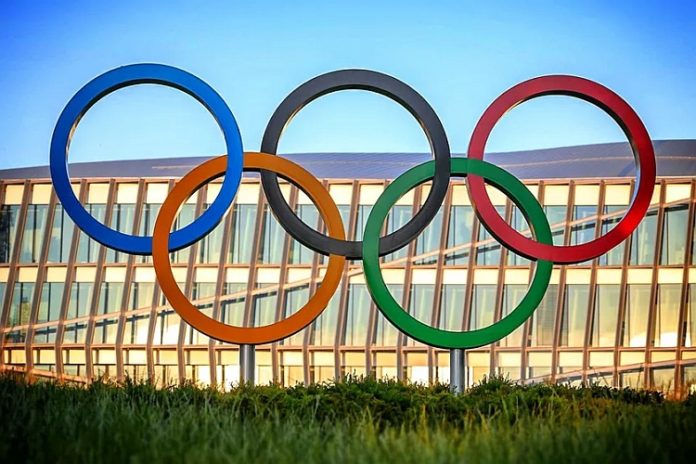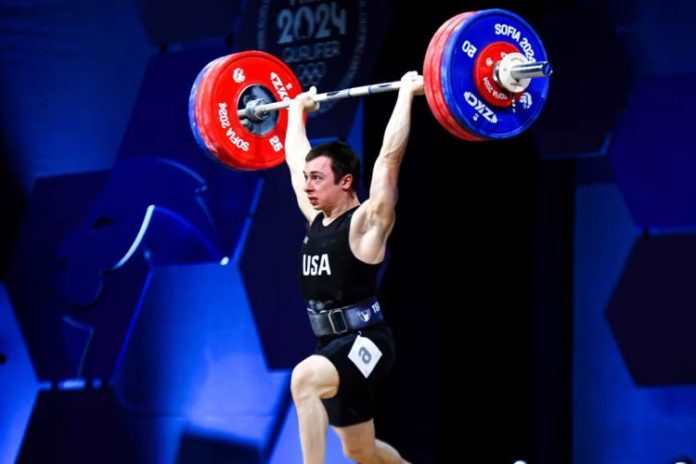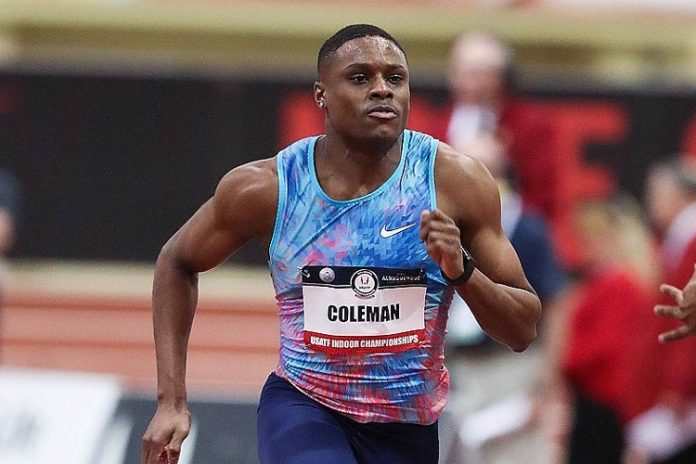★ The Sports Examiner: Chronicling the key competitive, economic and political forces shaping elite sport and the Olympic Movement.★
★ To get The Sports Examiner by e-mail: sign up here! ★
★ Can you help? Now 26 donors have covered 52.3% of our technical and support costs goal. But we need your help too. Please consider a donation to help keep TSX going. Thank you. ★
≡ THE 5-RING CIRCUS ≡
● The IOC may be moving toward organizing future Olympic Games itself, as FIFA is doing with the 2026 World Cup in Canada, Mexico and the U.S. Moves have already been made to take over specific aspects.
● World Championships: Aquatics (2: U.S. wins Mixed Medley relay and Haughey gets 200 m Free gold; U.S. and Hungary in women’s polo final) = Biathlon (Boe and Boe 1-2 in 20 km Individual) ●
● Panorama: Sarajevo 1984 (Torvill and Dean return to mark 40 years) = Paris 2024 (PacificAus Sports announces grants to 13 island nations) = Russia (Deputy Sports Minister says 100 Russians could qualify for Paris) = Aquatics (Kuwait government asked to investigate World Aquatics chief regarding Kuwait NOC funds use) = Athletics (third passenger in Kiptum’s car released from hospital after treatment) = Bobsled (Swiss brakeman seriously injured in four-man training crash) = Cross Country Skiing (Klaebo & Svahn take Sprints in Canmore World Cup finale) ●
LANE ONE:
The IOC must be thinking it should organize future Olympic Games itself
Organizing an Olympic Games is difficult, significantly due to the sheer number of athletes, events, sports and facilities being used. For this summer’s Games of the XXXIII Olympiad in Paris, there will be 10,500 athletes from 204 National Olympic Committees, 329 events in 32 sports, spread out from Paris to Tahiti. And it gets bigger in Los Angeles in 2028, with more than 11,000 athletes now expected to contest 36 sports, the most ever.
And nothing is easy.
Following the headaches of the postponement of the Tokyo 2020 Olympic Games to 2021 due to the coronavirus pandemic, the reputation of the Games took a hit from two major scandals that have led to criminal prosecutions in Japan for insider bribes to acquire sponsorships and the rigging of bids for test-event management and then for venue management during the Games.
That was followed by questions over the holding of the 2022 Winter Games in China under the heavy hand of the Chinese Communist Party – which asserted itself during a couple of news conferences during the Games – and now to public hand-wringing about Paris and whether the organizing committee will be able to meet its budget (which it apparently will) and public access around the city come July.
That doesn’t count the IOC’s ongoing tug-of-war with Italian politicians over where to hold the bobsled, luge and skeleton events for the 2026 Winter Games in Milan Cortina, with the IOC asking to use an existing facility and Italy opting to build a new track after years of delay, which may or may not be ready in time for the 2026 Games.
And the brouhaha in Brisbane, site of the 2032 Games, over whether the government-planned redevelopment of the famed Brisbane Cricket Ground – The Gabba – should be undertaken at an expanded cost of A$2.7 billion (about $1.75 billion U.S.). That answer appears now to be “no,” as the IOC suggested in its evaluation of the Brisbane bid, with existing facilities to be used instead.
Wouldn’t it just be easier for the IOC, now with more than 500 staff members, to just do the Games themselves?
Well, they are going to get a chance to see if this can work, courtesy of FIFA.
After more than 90 years of trusting its men’s World Cup to an organizing committee in the host country (countries), FIFA has scrapped the idea, and is staging the expanded 2026 World Cup in Canada, Mexico and the United States itself.
Staff members are being moved from the FIFA headquarters in Zurich (SUI) to offices in Coral Gables, Florida, and an energetic hiring program is underway for directors and managers to put together the biggest World Cup event, with 48 teams and 104 matches spread across 16 stadia in three countries.
There will be a huge staff, but it will be FIFA’s staff, not that of a temporary organizing committee formed specially to put the event on. FIFA has all the responsibility, all the headaches … and will keep all the money. And there is a lot of money coming into FIFA, which may surpass the IOC as the biggest single earner in international sports for its 2023-26 quadrennial, with a budget projection of $11 billion in revenue.
Could this translate to the Olympic Games?
Well, the IOC is already on that path, slowly taking over functions from the in-country organizers, piece by piece. Today, the IOC already has control of:
● Broadcasting, through its Olympic Broadcasting Services (OBS) subsidiary in Spain.
● Doping control, through the International Testing Agency, which it helped to create in 2018.
● Results, provided through its agreement with French technology giant Atos.
● Sports registration, now handled by the IOC’s sports department in-house.
● Tickets, now being overseen by the IOC in coordination with Paris 2024, as well as hospitality, under a recent agreement with U.S.-based OnLocation.
The IOC took control of worldwide television rights sales and created its worldwide sponsorship (TOP) program quickly after the financial success of the 1984 Olympic Games in Los Angeles, but did not immediately take further steps to begin organizing the event themselves. The staff was too small, the depth of experience far too shallow. But the IOC has grown and has a deep professional staff that could take over. And FIFA is providing a free-to-view test of the concept.
The IOC also gives away a lot of its money from television and sponsorships to local organizing committees. According to its own figures, it provided and will provide cash and in-kind support (U.S. dollars):
● $1.531 billion to Rio 2016
● $1.892 billion to Tokyo 2020/2021 (including pandemic support)
● $1.700 billion to Paris 2024 ($1.265 billion in cash)
● $1.800 billion to Los Angeles 2028 ($1.335 billion in cash)
● $1.800 billion to Brisbane 2032 ($1.335 billion in cash)
Smaller amounts go to Winter Games hosts, stated as $887 million for PyeongChang 2018, $970 million for Beijing 2022 (including pandemic support) and $925 million for Milan Cortina 2026.
What the experiences over the sliding venue in Cortina and the Gabba in Brisbane demonstrate is that, under transformational chief Thomas Bach (GER), the IOC has committed itself through his Olympic Agenda 2020 and Olympic Agenda 2020+5 to a “no-build” philosophy as regards the sports venues, although it still prefers to have an all-in-one Olympic Village if possible.
By sticking to this requirement, the number of locations which can host an Olympic Games or Winter Games shrinks considerably, but the event becomes easier to manage. By planning and staging the Games itself, the IOC could hire local talent – as FIFA is doing – to manage the functions which need local knowledge and do the rest itself, building up the experience of its managers from event to event.
It’s a lot to chew, but it’s cheaper, much more controllable – no Italian politicians to deal with – and a strictly business proposition for a host city or country. The IOC discusses the possibilities with interested countries, regions and cities, determines the best, friendliest and most dependable option and then contracts for the services it wants and the promises made by the selected host.
Not personal. Strictly business.
This idea has been in discussion, in some form, for nearly 40 years, since the end of the 1984 Los Angeles Games. But it seems much more real now, with the question of whether Bach’s successor is willing and able to make the leap.
And it is a considerable leap. But if the IOC is to realize the full value of the Games, it will have to obtain fuller control of its enterprise, as FIFA is doing now and as the National Football League has so brilliantly demonstrated with its annual Super Bowl. And in order to be effective, such a management scheme will require placing future Games in countries with strong contract law systems to allow the IOC to enforce its agreements with national, regional and local governments.
If Bach does decide to stay on for an additional term as President to 2029, as suggested by some IOC members at last October’s IOC Session in India, he could start moving in this direction. But the IOC is contractually committed to in-country organizing of the Olympic Games through 2032 and the Winter Games through 2034 when Salt Lake City is formally approved this summer.
That means a decision on a full takeover will come from the next IOC President, whoever that will be. If FIFA succeeds with its do-it-yourself program for the 2026 World Cup and beyond, look for the braintrust in Lausanne to begin thinking about how this could work for a 2036 Olympic Games, wherever it might be held.
Rich Perelman
Editor
≡ WORLD CHAMPIONSHIPS ≡
● Aquatics ● At the World Aquatics Championships in Doha (QAT), the U.S. dominated the Mixed 4×100 m Medley relay to close the Wednesday evening program with three of the four members of the team that won this race in 2022!
Two years ago, Hunter Armstrong, (Back), Nic Fink (Breast), Torri Huske (Fly) and Claire Curzan (Free) defeated Australia, 3:38.79 to 3:41.34. In 2024, the result was about the same, although a little slower.
Armstrong led off again and stormed to a solid lead over Poland, and Fink extended the lead with Italy moving into second. Curzan finished her leg with a nearly three-second edge on Australia and then Kate Douglass took over with the fastest Free leg among the seven women anchors for a 3:40.22 final, the no. 5 performance in American history.
Australia, with Shayna Jack on anchor, was second in 3:43.12 and Great Britain was third at 3:45.09. The U.S. has medaled all six times that this race has been held at the Worlds, with three wins, two silvers and a bronze. Fink has been on three in a row (2-0-1).
Australia’s Elijah Winnington, the 400 m World Champion in 2022, had the early lead in the men’s 800 m Free final, but gave way to Italian star Gregorio Paltrinieri, the 2019 Worlds gold medalist in this race in mid-race. But Ireland’s Daniel Whiffen came on late, took the lead going into the final lap and won his first Worlds medal – a gold – in 7:40.94, with Winnington getting a second silver (also in the 400 m Free) in 7:42.95 and Paltrinieri third in 7:42.98.
The 50 m Breaststroke final was ultra-close, with the top seven within 0.65 seconds and Australian Sam Williamson touching first for his first individual Worlds medal in 26.32, that was 0.07 better than Nicolo Martinenghi (26.39) and 0.17 up on the U.S.’s Fink (26.49), the 100 m Breast winner. Martinenghi won the silver in both the 50 and 100 races, giving him two career Worlds silvers in each (also the 50 in 2022 and 100 in 2023) to go along with his 2022 gold in the 100.
The men’s 200 m Butterfly belonged to Japan’s Olympic silver winner Tomoru Honda, who pulled away from Alberto Razzetti (ITA) late for a 1:53.88 to 1:54.65 victory, with Martin Espernberger (AUT: 1:55.16) getting the bronze.
Hong Kong’s Siobhan Haughey, the two-time winner of the women’s 200 m Free in the Short Course Worlds, got the long-course gold in 1:54.89, beating New Zealand’s 400 m Free winner Erika Fairweather (1:55.77) and Australian Brianna Throssell (1:56.00).
The men’s 100 m Free and 200 m Medley finals come Thursday, along with the women’s 50 m Back, 200 m Fly and 4×200 m Free.
¶
The U.S. and Hungary advanced to Friday’s final of the women’s water polo tournament, after close wins in their semifinals.
The U.S. faced Spain and jumped to a 3-1 lead in the first quarter and had a 6-4 lead at the half. The American women scored two more in the third to one for Spain for an 8-5 lead going into the final quarter and held on for an 11-9 victory. Jenna Flynn scored three for the U.S., and Maddie Musselman, Ryann Neushul and Jewel Roemer each had two. Elena Ruiz and Isabel Piralkova each scored three goals for Spain, but U.S. keeper Ashleigh Johnson made 11 crucial saves.
Hungary and Greece played won to the wire after a 6-6 first half and then each scored one goal in the third and two in the fourth for a 9-9 tie. In the shoot-out, Hungary won 4-2 for the 13-11 final. Rebecca Parkes led the winners with three scores.
The final will be a re-match of the fifth-place game from the 2023 Worlds,, where the sides were tied, 11-11, and went to a penalty shoot-out, won by the U.S., 4-2. The U.S. won four Worlds golds in a row from 2015-22 and has won seven times in all, while Hungary won its lone women’s Worlds title in 1994.
● Biathlon ● Not only did Norway continue its domination of the 2024 IBU World Championships in Nove Mesto (CZE), but so did the Boe family.
Superstar Johannes Thingnes Boe won his second race at the Worlds – he won the 12.5 km Pursuit earlier – but led a 1-2 with his older brother Tarjei Boe in 45:49.0 (1 penalty) and 46:47.9 (1), with Germany’s Benedikt Doll breaking up the sweep in third at 47:42.3 (1).
Campbell Wright was again the top American, in 20th place (50:58.01/3), followed by Sean Doherty in 23rd (51:13.5/2).
J.T. Boe’s victory not only was a successful defense of his 2023 title victory, but upped his astonishing Worlds career medal count to 35, with 19 golds, 10 silvers and four bronzes. Old brother Tarjei – he’s 35 and J.T. is 30 – won this race in 2011 and has a career haul of 25 Worlds medals (11-6-8).
Norway has now won eight of the nine men’s medals at this year’s Worlds. Thursday brings the Single Mixed Relay, and the championships will conclude on Sunday.
≡ PANORAMA ≡
● Olympic Winter Games 1984: Sarajevo ● British stars Jayne Torvill and Christopher Dean, icons for their magnificent, gold-medal-winning Free Dance performance to Ravel’s “Bolero” in 1984, returned to Sarajevo (BIH) for a performance to mark 40 years since their Winter Games triumph.
They appeared Wednesday evening at the opening of a figure skating tournament held as part of the 40-year anniversary program.
Torvill, now 66, and Dean, now 65, retired from competitive skating after their 1984 gold-medal performance – and four straight World Championships golds in 1981-82-83-84 – then came back when the rules against professional skaters were relaxed and won a bronze at the 1994 Lillehammer Winter Games. They plan to retire from performing in ice shows in 2025.
● Olympic Games 2024: Paris ● The Australian government announced its 2024 PacificAus Sports grants that will provide funding to 250 athletes from 13 Pacific island nations to help them qualify for and compete at the Paris 2024 Olympic and Paralympic Games.
The project funds programs in 15 sports, as part of the Australian Sports Diplomacy 2030 strategy launched in 2019. This is Australian public funding from the Department of Foreign Affairs and Trade, with delivery coordinated by the Australian Olympic Committee and the Oceanian National Olympic Committees (ONOC), and continues the direct support project that was started for the Tokyo 2020 Games.
Observed: This is an interesting project that is welcomed by the International Olympic Committee. The PacificAus Sports program is not unique; other countries – including the U.S. – have active sports diplomacy programs, but Australia’s project is noteworthy for its high profile and direct cash infusion to foreign athletes.
● Russia ● Alexey Morozov, the Russian Deputy Minister of Sports gave an upbeat projection of possible Russian qualifiers for Paris 2024 on Wednesday:
“Up to 100 people can qualify for the Olympic Games. But the criteria for admitting Russians to international tournaments are changing, so this number may change. Our athletes participated in tournaments in eight sports around the world.”
Under the current edicts of the International Olympic Committee, Russian qualifiers will only be able to compete as neutrals, and their “neutrality” will be reviewed by the IOC independent of any approvals by the International Federations.
It would be surprising if as many as 100 Russian athletes were able to compete in Paris, but they have had strong results in judo, taekwondo and wrestling, federations which have admitted a significant number of Russians back into international competitions. Ukrainian officials have sent notices to the IOC about specific athletes they consider should be ineligible in view of support for the invasion of Ukraine that began in February 2022.
● Aquatics ● Veteran German investigative journalist Jens Weinreich reported Wednesday that the Kuwait Public Authority for Sport has asked for a criminal inquiry over the use of funds allocated for the GCC [Gulf Cooperation Council] Games, held in Kuwait City in June 2022.
Weinreich’s Inquisitor Magazine site explained that the request for inquiry is about funds allocated for the event that were provided to one or two companies controlled by Kuwait Olympic Committee Secretary General Husain Al-Musallam, also the current President of World Aquatics and the former long-time Secretary General of the Olympic Council of Asia.
● Athletics ● The third passenger in the vehicle driven by marathon world-record holder Kelvin Kiptum (KEN) which crashed near Eldoret (KEN) late Sunday evening and resulted in his death and that of his coach, Gervais Hakizamana (RWA), was treated and released.
The Kenyan daily The Nation said the passenger was Sharon Kosgey, who was in the back seat and suffered only minor bruises as well as trauma.
Investigators said Kiptum’s Toyota Premio showed no evidence of mechanical failure and may simply have been going too fast and veered off the road, landed in a ditch and then smashed into a tree.
The Kenyan trials for the African Games – to be held in March in Ghana – were scheduled for this weekend in Nairobi have been postponed.
● Bobsled ● A frightening injury to Swiss brakeman Sandro Michel, 27, during a training crash in Altenberg (GER) on Tuesday; the International Bobsleigh and Skeleton Federation statement explained:
“During the official bobsleigh World Cup training in Altenberg, Germany, on February 13th, 2024, the 4-man bobsleigh of the Swiss pilot Michael Vogt crashed. As a result, the brakeman Sandro Michel fell of the sled and was run over by the bobsleigh which was uncontrollably sliding back from the finish area. The medical team on-site took the necessary steps to take care of the injured athletes.”
The Associated Press noted:
“Michel lost consciousness in the crash and was airlifted from the track to a hospital about 75 miles (120 kilometers) away in Dresden because of the severity of injuries he suffered to his leg, hip, thigh and chest, team and IBSF officials said.”
Driver Vogt suffered a concussion and brakemen Dominik Hufschmid and Andreas Haas had minor injuries.
Vogt and Michel are a successful two-man team, bronze medalists at the 2023 Worlds and standing third in the IBSF World Cup after six of eight stages, and Vogt’s four-man team ranks fourth this season.
Bob, luge and skeleton sleds moving backwards on the track are not uncommon and pose a significant safety threat, especially at high speeds.
● Cross Country Skiing ● The big FIS World Cup program at Canmore (CAN) concluded on Tuesday with the men’s and women’s Classical Sprints, and wins for Norway and Sweden.
Reigning World Cup champ Johannes Hoesflot Klaebo won the men’s Sprint for his eighth World Cup victory of the season in 3:01.29, trailed by Richard Jouve (FRA: 3:01.76) and Erik Valnes (NOR: 3:01.90). Norwegian men have now won eight World Cup races in a row, half of them by Klaebo.
Swede Linn Svahn won her fifth World Cup Sprint in a row in the women’s final in 3:12.20, with Norway’s Kristine Skistad second (3:14.33) and fellow Swede Jonna Sundling third (3:15.73). In the eight Sprint races held so far this season, Svahn started out fifth, then third, then second and now five straight wins.
The World Cup circuit moves on to Minneapolis, Minnesota, hometown of the seasonal leader Jessie Diggins of the U.S. for a Freestyle Sprint on Saturday and a 10 km Free race on Sunday. She has a 2,103 to 1,843 lead on Svahn after 25 of 34 races, trying for a second World Cup seasonal title.
¶
You can receive our exclusive TSX Report by e-mail by clicking here. You can also refer a friend by clicking here, and can donate here to keep this site going.
For our new, 920-event International Sports Calendar for 2024 and beyond, by date and by sport, click here!


























